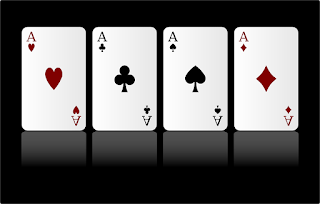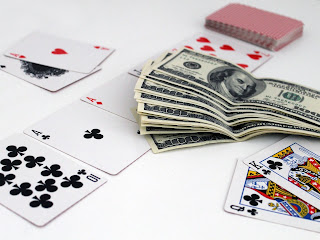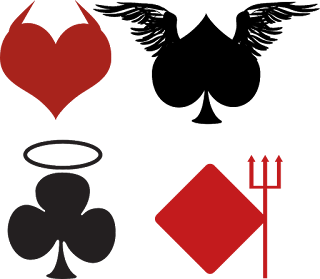Online Poker Strategy – Thinking Like a Poker Player
Online poker geniuses are usually portrayed as tight and forceful: "These poker stars don't play numerous hands, however when they play them, they play them like they had the nuts."
That is a decent broad portrayal, however, it doesn't state a lot. What's more, it's not even thoroughly directly about no-restriction games, as a strong free, forceful player is an individual to be dreaded. Consequently, when we think individuals state a player is tight/forceful and along these lines great, we truly think they imply that the player has aced four basic components of online poker.
#1. Math abilities
Best poker websites in India players know general rates. They realize that you have around 1 out of 8 possibilities of hitting a set when holding a pocket pair and that you have around a 1 out of 3 possibilities of finishing a flush draw at the lemon.
They know the significance of 'outs.' Outs are essentially the number of cards that will improve your hand. Check your outs, duplicate them by two, and include two, and that is generally the rate shot you have at hitting.
They can make sense of the 'pot chances.' Knowing outs is trivial except if it's converted into balanced, determined wagering.
Realizing you have a 20% possibility of hitting, what do you do at that point? Indeed, just once you make sense of your opportunity of hitting/winning, you separate the size of the pot at the waterway (for example the present pot in addition to the measure of cash that you think will be included through future wagers) by the sum you need to place in. On the off chance that you have a 20% possibility of hitting and the best to you is 50 if the pot at the stream will be more noteworthy than 250, call. If not, crease.
Math aptitudes are the most fundamental information. The reason for this book isn't to go over pot chances, suggested changes, and so on. That is the very first moment perusing. Any individual who doesn't comprehend these ideas ought not to play in a game until they do.
#2. Order
Great poker players request a bit of leeway. What isolates a triumphant poker player from a fish is that a fish doesn't hope to win, while a play poker player does. A fish is cheerful playing craps, roulette, the openings; he just wants to luck out. A poker player doesn't plan to luck out; he just expectations others don't luck out.
Great poker players comprehend that an alternate game requires an alternate order. A trained no-restriction player can be a stupid utmost player and the other way around. A restrained point of confinement player is constantly an exceptionally tight preflop. The individual won't play an excessive number of hands, just the ones that have an awesome possibility at winning.
In any case, a taught no-restriction player is VERY extraordinary. This player isn't so worried about paying an excessive number of blinds; rather, the individual wouldn't like to get caught. The principle contrast between a taught restraint and no-restriction player is that the point of confinement player abstains from insignificant away his stack a tiny bit at a time while a trained no-restriction player abstains from losing his entire stack in one hand. Thus, a trained no-restriction player can play a lot of hands. Preflop, the person can be as free as 'that' young lady in secondary school. Be that as it may, a great no-restriction player realizes when to hurl hands that will get the person in question is a tough situation.
A trained player realizes when to play and when to stop. He perceives when he is on tilt and knows when a game is excessively delicious to simply stop while ahead.
A restrained player realizes that he isn't great. At the point when a taught player commits an error, he learns. He doesn't accuse others. He doesn't cry. He gains from the slip-up and proceeds onward.
#3. Mental Skills
A decent player is definitely not a conceited player. He might be the greatest SOB you know. He may not discuss care about anybody yet himself and may appreciate taking nourishment from poor people. In any case, when a poker expert strolls into a poker room, he generally relates to his adversaries. He attempts to consider what they think and comprehends the choices they make and why they make them. The poker professional consistently attempts to have a response to these inquiries:
what does my adversary have?
what does my rival think I have?
what does my adversary think I think he has?
Knowing the response to these inquiries is the initial step, controlling the appropriate responses is the second and increasingly significant advance. On the off chance that you have a couple of rulers and your enemy has a couple of aces, and you both know what each other have and both realize that you each know what different has, why poker games on the web? A poker star controls the last two answers by slowplaying, quick-playing, and feigning so as to distract his adversary.
Great poker players realize that brain science is a whole lot more significant in a no-restriction game than in a constrained one. Point of confinement games regularly transforms into math fights, while no-restriction games convey a solid brain science segment. Nonetheless, in a no-restriction game, that bot would be toast.
#4. A Clear Understanding of Risk-versus Reward
Pot chances and requesting a bit of leeway fall into this class. Poker players are eager to take a since quite a while ago shot hazard if the prize is sufficiently high, however just if the normal return is higher than the hazard.
All the more significantly, they comprehend the hazard versus reward nature of the game outside of the real poker room. They know what number of banks they have to play, and how a lot of cash they need available for later to cover different costs throughout everyday life.




Comments
Post a Comment